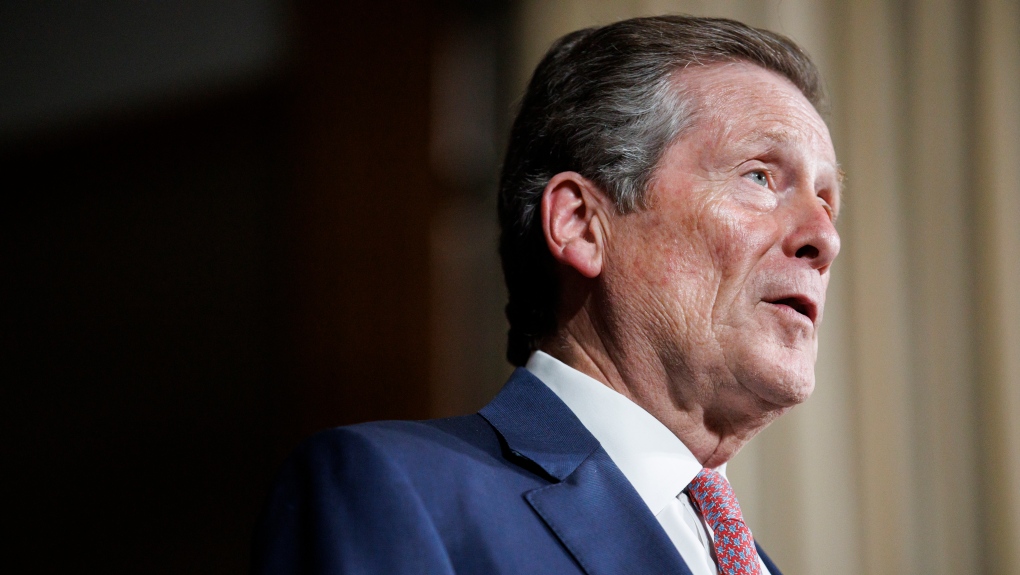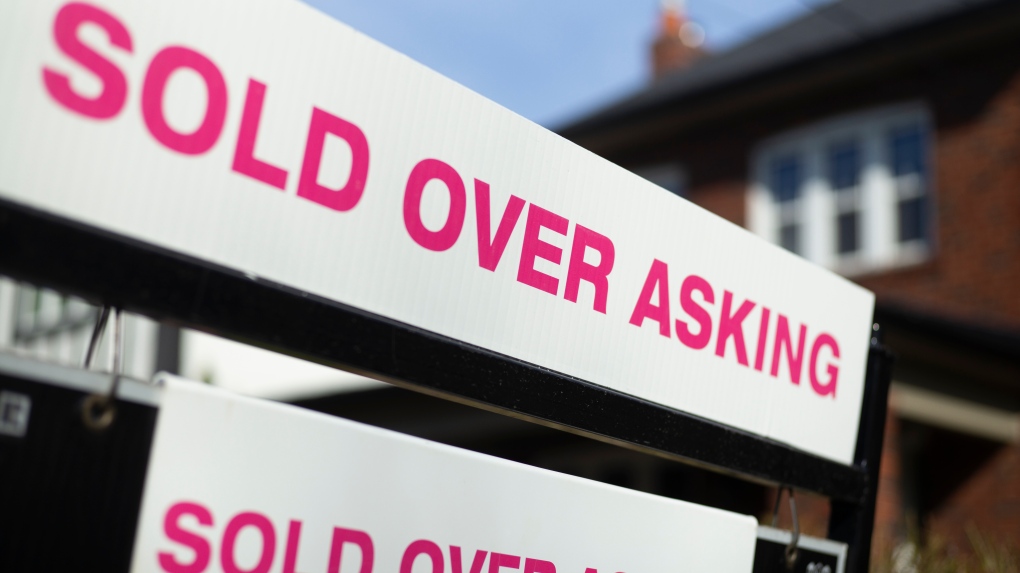John Tory announces 5-point plan to build homes faster, tackle affordability in Toronto
Toronto mayoral candidate John Tory has released a five-point plan to create more housing and address affordability challenges in the city.
Tory, who is seeking a third term, announced his first campaign policy about housing Tuesday morning, ahead of the municipal election in October.
- Download our app to get local alerts to your device
- Get the latest local updates right to your inbox
“ I believe we need to get more housing built, we need to get more affordable and supportive housing built and we need to have housing that is obtainable for middle class Torontonians,” Tory told reporters while at a housing construction site in Toronto's Distillery District.
Tory’s plan consists of five pillars:
- Expanding housing options by permitting “missing middle” housing
- Cutting red tape and speeding up approval times by creating a Development and Growth Division
- Asking the province to allow the city to enact a “use it or lose it” policy for developers sitting on approved, but undeveloped, land
- Allocating a portion of city-owned land to be developed by non-profits
- Incentivizing the construction of purpose-built rental housing by reducing fees and charges
Tory says expanding “missing middle” housing will include legalizing laneway suites and garden suites, and exempting developments of four units or less from development charges.
“We also need to include the option to create duplexes, triplexes, as well as the kind of walk-up apartment buildings found in many pre-war neighbourhoods,” Tory said.
 Toronto mayor John Tory, speaks inside Queen’s Park in Toronto, Monday, June 27, 2022. THE CANADIAN PRESS/Cole Burston
Toronto mayor John Tory, speaks inside Queen’s Park in Toronto, Monday, June 27, 2022. THE CANADIAN PRESS/Cole Burston
To speed up building approval times, Tory’s proposed Development and Growth Division would act as a “one-stop shop” to handle all aspects of development review and streamline the approval process.
Tory said the division would also prioritize and fast-track the approval of purpose-built rentals.
“This will be a reorganization of existing staff in the spin cycle of housing applications, and thus bouncing back and forth between different divisions of the city government. The Development and Growth Division will allow us to be more nimble in getting projects approved,” Tory said.
To avoid developers from sitting on approved land, Tory said he wants to enact a “use it or lose it” policy that mandates developers to start building on unused land within a certain timeframe or face the consequences of higher taxes and expired zoning approvals.
In an effort to create more co-op, supportive and affordable housing, Tory said he wants to allocate a portion of city-owned land to be developed by non-profit organizations.
“Cooperative housing works and for some reason we back away. We, meaning all of the governments, back away from the use of it in previous years,” Tory said.
 A house that sold for more more than the listing price in West-end Toronto, Sunday, April 24, 2022. THE CANADIAN PRESS/Graeme Roy
A house that sold for more more than the listing price in West-end Toronto, Sunday, April 24, 2022. THE CANADIAN PRESS/Graeme Roy
“If we can allocate the vacant land that we own as a city and encourage the other governments to do the same together with some of the other incentives we’ve been offering through programs like Open Doors and Housing Now…then I believe we will be able to build more supportive and affordable housing,” he added.
Mayoral candidate Sarah Climenhaga, who ran in the 2018 municipal election, commented on Tory's housing plan on Twitter and said "the will to actually remove housing barriers is what I don't see enough of."
"Hearing about housing is fine. What I care far more about than announcements is seeing housing created. It's important to understand where it is, and where and why it's not," Climenhaga tweeted Tuesday.
There are 31 candidates running in Toronto's mayoral race.
Voters are set to head to the polls on Oct. 24.
CTVNews.ca Top Stories

Fall sitting bookended by Liberal byelection losses ends with Trudeau government in tumult
The House of Commons adjourned on Tuesday, bringing an end to an unstable fall sitting that has been bookended by Liberal byelection losses. The conclusion of the fall sitting comes as Prime Minister Justin Trudeau's minority government is in turmoil.
2 B.C. police officers charged with sexual assault
Two officers with a Vancouver Island police department have been charged with the sexual assault of a "vulnerable" woman, authorities announced Tuesday.
Canadian government announces new border security plan amid Donald Trump tariff threats
The federal government has laid out a five-pillared approach to boosting border security, though it doesn't include specifics about where and how the $1.3-billion funding package earmarked in the fall economic statement will be allocated.
B.C. teacher disciplined for refusing to let student use bathroom
A teacher who refused to let a student use the bathroom in a B.C. school has been disciplined by the province's professional regulator.
Most Canadians have heard about Freeland's resignation from Trudeau cabinet, new poll finds
The majority of Canadians heard about Chrystia Freeland's surprise resignation from Prime Minister Justin Trudeau's cabinet, according to a new poll from Abacus Data released Tuesday.
Police chief says motive for Wisconsin school shooting was a 'combination of factors'
Investigators on Tuesday are focused on trying to determine a motive in a Wisconsin school shooting that left a teacher and a student dead and two other children in critical condition.
After investigating Jan. 6, House GOP sides with Trump and goes after Liz Cheney
Wrapping up their own investigation on the Jan. 6 2021 Capitol attack, House Republicans have concluded it's former GOP Rep. Liz Cheney who should be prosecuted for probing what happened when then-President Donald Trump sent his mob of supporters as Congress was certifying the 2020 election.
Wine may be good for the heart, new study says, but experts aren’t convinced
Drinking a small amount of wine each day may protect the heart, according to a new study of Spanish people following the plant-based Mediterranean diet, which typically includes drinking a small glass of wine with dinner.
The Canada Post strike is over, but it will take time to get back to normal, says spokesperson
Canada Post workers are back on the job after a gruelling four-week strike that halted deliveries across the country, but it could take time before operations are back to normal.


































